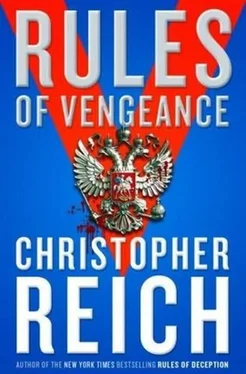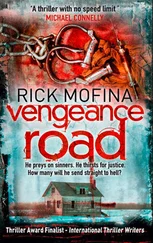“An apology for what?”
“For this morning. I’m sorry for barging in on you like that. I tend to get carried away.”
“Your manners need improvement, no doubt,” said Kate. “But that’s not what bothered me.”
“Oh? What was it, then?” Graves hurried to ask. “That I didn’t want to cooperate?”
How was it, she wondered, that someone so smart could be so damn stupid? The answer came to her at once. Men. The inferior species. “You still don’t get it, do you?”
The phone rang before Graves could answer. Motioning for her to give him a second, he picked it up. “What is it now?” Suddenly his face fell. “Oh, excuse me, Detective Watkins. I was expecting another call. Ransom? He did what? Good Lord!”
“What?” Kate put her head close to his, trying to listen, but Graves immediately walked away, nodding and grunting and mumbling “yes” over and over again. Finally he said, “I’m with DCI Kate Ford. It’s important that she hear what you have to say. I’m going to put you on speaker. Go ahead.”
“The woman’s name is Prudence Meadows,” explained a deep voice. “Jonathan Ransom shot and killed her husband two hours ago.”
Graves exchanged a glance with Kate that said he’d been right all along.
“There’s no question whatsoever,” Watkins continued. “Ransom and her husband were at university together years ago. The woman and her husband visited with him only last night at a reception at the Dorchester. According to Mrs. Meadows, Ransom came to the door of their home in Notting Hill at approximately nine-thirty. He demanded to speak to her husband. She said he looked agitated, but she let him in anyway. The two men retired upstairs for an hour. During that time she put her children to bed and then went to her bedroom to read. At ten forty-five she heard raised voices coming from downstairs. She went to see what was going on and found Ransom holding a gun on her husband, shouting that he wanted money and the keys to his car. Dr. Meadows refused. An altercation ensued, and Ransom shot the man dead.”
“Go on,” said Graves. “Then what did Ransom do?”
“Mrs. Meadows tried to call the police and he put a dagger through her hand into the table to stop her.”
“Didn’t he try to kill her, too?” asked Kate, staring hard at Graves.
“No. Just left her like that, then took the keys to the car and fled.”
Kate shot Graves a perplexed look. “Can we speak with Mrs. Meadows?” she said.
“Not right yet,” responded Watkins. “She’s in surgery for the hand. You can have a go at her tomorrow morning.”
“Right,” said Graves. “Anything on the car Ransom stole?”
“Not yet, but we’re looking.”
“Cover all the airports and the ports along the coast.”
“Already done.”
“Of course it is. Thank you again for getting in touch so promptly.” Graves hung up. He raised a hand to stop Kate before she could begin. “I know what you’re going to say. If Ransom killed the husband, why did he leave the woman alive?”
“It must have been an accident. He’s not a killer.”
“You keep saying that, and the people around him keep dying.”
The phone rang again. It was Roberts, who stated that Mrs. Isabelle Lauren’s primary residence was in the city of Hull, in the northeast of England. Graves requested that an aircraft be made ready and told Kate to meet him early the next morning at Thames House for a briefing prior to departure.
As she walked to the door, he called, “You never did tell me what bothered you so much.”
Kate looked over her shoulder. “You really want to know?”
“Couldn’t sleep if I didn’t.”
“What bothered me, Colonel Graves-”
“Call me Charles.”
“What bothered me, Charles, wasn’t that you came into my home unannounced and took it upon yourself to march into my kitchen.”
Graves set his hands on his hips. “What the hell was it then, DCI Ford?”
“Kate.”
“Okay… Kate.”
“I saw your Rover yesterday morning at One Park. What really pissed me off was that you arrived before I did, and you didn’t tell me. It was my crime scene. I don’t like to be second to anyone.”
The Peninsular and Orient ferry Princess of Kent , 179 meters in length, 40 meters from sea to smokestack, and 33 in width, with a draft of 22,000 tons and capable of carrying 500 automobiles or 180 trucks, along with 2,000 paying passengers, sat moored at the dock of the Dover-Calais terminal, ready to commence boarding in twelve minutes and thirty-seven seconds, as noted by the enormous digital clock arrayed on the neighboring warehouse. It was 6 a.m. The sun had come up a half-hour ago, and though the temperature was no more than seventy-five degrees, there wasn’t a lick of wind, and it was already uncomfortably humid.
Jonathan snaked through the idling trucks. Drivers milled outside their cabs, smoking, exchanging trade tips with one another, or just stretching their bones. He was studying the size of the cabs, the addresses of their owners (usually noted on the driver’s door), as well as the rigs’ home country plates. As important, he was determining whether the driver was at the wheel waiting to guide his rig aboard the ferry or somewhere en route to or from the ticket office.
He eyed a Peterbilt cab belonging to the freight forwarder Danzas and piloted by a M. Voorhuis of Rotterdam, Holland. The cab would be perfect, offering ample room to hide a fugitive eager to reach the European continent. Better yet, it belonged to an established freight company. Customs and immigration checks were carried out upon landing in France. Inspection was supposedly random, but he knew that vehicles registered to the established companies were rarely selected.
A man he assumed to be Voorhuis stood on the running board, smoking. Next to him, resting her head on his shoulder, was a frizzyhaired woman, all jeans, black leather, and skull rings. But Rotterdam wasn’t any good, and three was definitely a crowd.
Eleven minutes.
A Volvo FH16 carrying a Cat backhoe out of Basel, Switzerland, gave Jonathan momentary hope. The cab had a rest area behind the driver’s seat, and the Swiss plates meant free passage across borders. Even the driver looked okay, a middle-aged schoolboy wearing a silver cross around his neck. It was the biblical scripture airbrushed on his cab’s side panel that was the problem. If push came to shove, there would be no doubt that he would offer up a prayer and scream for the police. Besides, Switzerland wasn’t far enough south.
It was then that he saw it. Situated above the ticketing office stood a regulation highway-sized digital billboard, and on the billboard was a color photograph of Dr. Jonathan Ransom. A scroll running beneath the picture read, “Have you seen this man? His name is Dr. Jonathan Ransom and he is wanted for questioning in association with the London car bombing of 7/26. Ransom is six feet tall, approximately 180 pounds, and is thought to be armed. Do not attempt to approach him on your own. If you have any knowledge of his whereabouts, call…” A London number followed.
Despite the heat, Jonathan felt a chill along the back of his neck. All he had in the way of a disguise was a watchman’s cap to cover his graying hair and a pair of wraparound sunglasses. It wasn’t much, but for the moment, no one could match him to the man on the billboard. He stared at the picture of himself. It was the same photo used in the convention’s brochure. There was no longer any chance of bribing his way onto a truck. He’d have to sneak aboard.
The clock ticked down to ten minutes.
Ten minutes to find a way out of England.
Jonathan rubbed the sweat out of his eyes and kept moving.
Читать дальше












